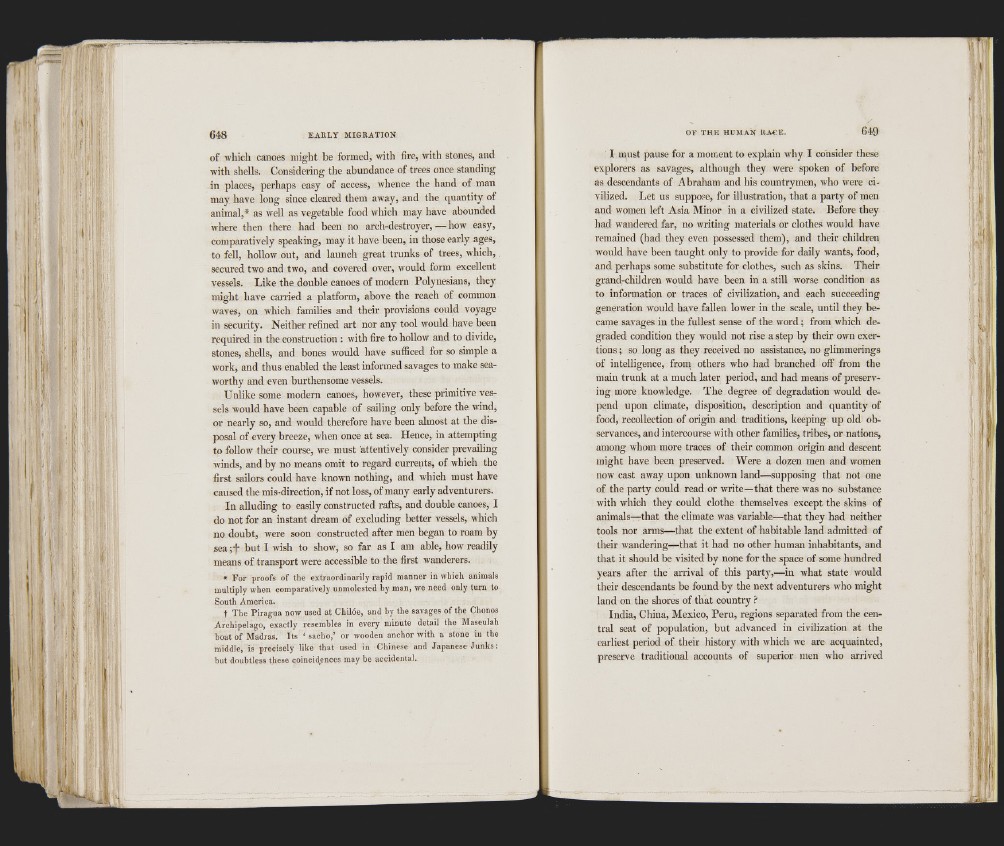
' i !
! !
! 1, * '
P I f
1i 1 1 *J• -illiIjJ!,'
^: (f ^
: ft
i i 1 :■
• 0 J i 0
, , '/■ ir
of which canoes might be formed, with fire, with stones, and
with shells. Considering the abundance of trees once standing
in places, perhaps easy of access, whence the hand of man
may have long since cleared them away, and the quantity of
animal,* as well as vegetable food which may have abounded
where then there had been no arch-destroyer,— how easy,
compai'atively speaking, may it have been, in those early ages,
to fell, hollow out, and launch great trunks of trees, which,
secured two and two, and covered over, would form excellent
vessels. Like the double canoes of modern Polynesians, they
might have carried a platform, above the reach of common
waves, on which families and their provisions could voyage
in security. Neither refined art nor any tool would have heen
required in the construction ; with fire to hollow and to divide,
stones, shells, and hones would have sufficed for so simple a
work, and thus enabled the least informed savages to make seaworthy
and even burthensome vessels.
Unlike some modern canoes, however, these primitive vessels
would have been capable of sailing only before the wind,
or nearly so, and would therefore have been almost at the disposal
of every breeze, when once at sea. Hence, in attempting
to follow their course, we must attentively consider prevailing
winds, and by no means omit to regard currents, of which the
first sailors could have known nothing, and which must have
caused the mis-direction, if not loss, of many early adventurers.
In alluding to easily constructed rafts, and double canoes, I
do not for an instant dream of excluding better vessels, which
no doubt, were soon constructed after men began to roam by
sea ; f but I wish to show, so far as I am able, how readily
means of transport were accessible to the first wanderers.
• For proofs of the extraoriiinarily rapid manner in which animals
multiply when comparatively unmolested by man, we need only turn to
South America.
t The Piragua now used at Chilóe, and by the savages of the Chonos
Archipelago, exactly resembles in every minute detail the Maseulah
boat of Madras. Its ‘ sacho,’ or wooden anchor with a stone in the
middle, is precisely like that used in Chinese and Japanese Junks:
but doubtless these coincidences may be accidental.
I must pause for a moment to explain why I consider these
explorers as savages, although they were spoken of before
as descendants of Abraham and his countrymen, who were civilized.
Let us suppose, for illustration, that a party of men
and women left Asia Minor in a civilized state. Before they
had wandered far, no writing materials or clothes would have
remained (had they even possessed them), and their children
would have been taught only to provide for daily wants, food,
and perhaps some substitute for clothes, such as skins. Their
grand-children would have been in a still worse condition as
to information or traces of civilization, and each succeeding
generation would have fallen lower in the scale, until they became
savages in the fullest sense of the word; from which degraded
condition they would not rise a step by their own exertions
; so long as they received no assistance, no glimmerings
of intelligence, from others who had branched off from the
main trunk at a much later period, and had means of preserving
more knowledge. The degree of degradation would depend
upon climate, disposition, description and quantity of
food, recollection of origin and traditions, keeping up old observances,
and intercourse with other families, tribes, or nations,
among whom more traces of their common origin and descent
might have been preserved. Were a dozen men and women
now cast away upon unknown land—supposing that not one
of the party could read or write—that there was no substance
with which they could clothe themselves except the skins of
animals—that the climate was variable—that they had neither
tools nor arms—that the extent of habitable land admitted of
their wandering—that it had no other human inhabitants, and
that it should be visited by none for the space of some hundred
years after the arrival of this party,—in what state would
their descendants be found by the next adventurers who might
land on the shores of that country .?
India, China, Mexico, Peru, regions separated from the central
seat of population, but advanced in civilization at the
earliest period of their history with which we are acquainted,
preserve traditional accounts of superior men who arrived
J. ll!
:li I!"
•' !CI